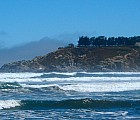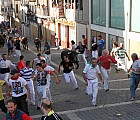Reading Hemingway in a Foreign Country


Hemingway said he always hated to “leave a place” and so do I. As much as I love to travel, I hate saying good-bye to the friends I make in new places, even as I look forward to my next trip.
I have just come home from Chile to get ready for the Hemingway conference in Petoskey and another trip to Spain, but I wanted to tell you a Hemingway story.
I started this piece in Chile so I’ll keep it as it was, in the present tense. Here goes:
I just finished rereading For Whom the Bell Tolls here in Chile, where I have been living for the past five and a half months. We are in a small fishing town on the coast about twenty miles north of Valparaiso. Unlike our glamorous neighbors in Vina del Mar or Renaca, Concon’s residents are maids and workmen, often holding two jobs to support their families. Fishing is the main work here. The men go out to sea each night to fish; their boats are brightly painted and surprisingly small. The sea, in comparison, seems vast.
Because we walk so much, I have come to know the people who work in my neighborhood, the kind of people Hemingway might have met in Key West during the depression or in Cuba or fighting in Spain; working people, humble people, locals. People who stand in the streets or in doorways all day and all night, talking and telling stories, living in a rhythm that is perplexing to most westerners.
Almost every day I stop into a small corner store to buy the odd items we need. It’s unlike any store you would find in the United States or most modern countries, and all neighborhoods in South America have them: small, disorganized, well-worn kioskos. The store is dirty and very dark, when you step inside on a sunlit day, it’s like entering a cave. An older Chilean woman runs it with her family, which is comprised of her five sons and many grandsons. Together they make a living in a space of 200 square feet, at the most. They sell unpolished vegetables out of wooden crates and burlap bags, often with dirt and sometimes spiders still clinging to them. They sell TP and milk, matches and soap: cigarettes and bruised bananas – the basics.
Before I began a friendship with Libertad, the owner, I was a little intimidated by her. She can seem quite serious, forbidding in stature, very much in command, and not above overcharging gringos when she can. Surrounded by her sons and grandsons, she is in charge of all of the men around her, most of them younger, stronger, and taller than her. As she instructs, they stack boxes, and lift enormous sacks of carrots and potatoes. They greet customers and negotiate buses and cabanas for tourists coming to the coast on weekends.
By American standards, her store is dirty and very dark. When you step inside on a sunlit day, it’s like entering a cave. Taking a break from reading Hemingway, I would sometimes walk down to her store to buy water or crackers and stretch my legs, my thoughts shifting from the Spanish civil war to my surroundings in Chile. We became used to seeing each other every day. Standing inside with her while the sun blazed outside, I practiced my Spanish and smiled a lot. I guessed that she and her family all lived together somewhere behind the store. Do you know where I am going with this? Before too long, she became my Pilar, living just a few doors down.
Until I saw her as Pilar, I could not image how her life experiences might intersect with mine. I wondered about the difficulties of her life, and how she came to be the Jeffa, surrounded by men of different ages in such a small dark place. I saw her differently and allowed myself to stay with her a little longer on each visit. One day, as we were standing at her counter, she rescued me from my mangled sentence in Spanish to reveal that she spoke fairly good English all along!
In almost six months of living in Chile, we never met another American, even passing through, so it’s not surprising that she already knew a little bit about us before I shared it. In that small village we had surely been watched and talked about. Within a few days, her disposition moved from distant to protective. We began to ask about each other and talk about our own lives, and a tenderness emerged between us that surprised everyone – even her employees. I go in more often now for little things, but mostly to talk. I practice Spanish and she practices English. I learned that she is 72 years old and does indeed live behind her store. Her name is Libertad. Over the years she has been able to buy the land her little store stands on, a hovel of a store sitting on a glorious patch of earth facing the sea.
One day, she pressed a gift into my hand, a regalo – and nothing could have surprised me more. She must have heard that I was resting and recovering my health here in Chile, for in my hand she had hastily put a beautifully cut piece of quartz, for “buen onda” she said.
Hemingway’s own tenderness towards his Pilar, the formidable woman in the midst of the Spanish civil war who thought she was ugly, became a bridge with a stranger I would not have experienced without him. Hemingway clearly loved his character Pilar and invited me to see a woman like her in a totally different way. Libertad and I had crossed several barriers, cultural, language, age, and vastly different life experiences. This was by far the moment I treasure the most about my time in Chile. This experience makes me understand what kind of traveler Ernesto Hemingway must have been, and what kinds of people he talked with and opened his life to; inviting us to do the same.
 One night, I told my husband about how I envisioned Pilar as the woman who runs the mercado down the street. To my great surprise, he thought that her son, the unshaven, rough and rowdy oldest, who always stands in the doorway of the store, looking out, was like Pablo. We reflected that Libertad must have had a husband or a partner long ago because she has a big family around her, and we noted how hard she worked to keep her small tribe going. Thinking about her life, about living and working day after day in that small dark store, I can’t help myself from hoping that sometime in her youth, she had some fireworks in Valencia.
One night, I told my husband about how I envisioned Pilar as the woman who runs the mercado down the street. To my great surprise, he thought that her son, the unshaven, rough and rowdy oldest, who always stands in the doorway of the store, looking out, was like Pablo. We reflected that Libertad must have had a husband or a partner long ago because she has a big family around her, and we noted how hard she worked to keep her small tribe going. Thinking about her life, about living and working day after day in that small dark store, I can’t help myself from hoping that sometime in her youth, she had some fireworks in Valencia.
~ Allie
To read another essay about reading while traveling, click here:
The story of you and Ernest Hemingway








Very nice post. She is quite a woman; her appearance and her history. I liked that Hem was your guide, and she was Pilar!
I like the crowded mercado – we had them in my old neighborhood & they are a self-contained world.
Nicely told story, Allie.
Thank you Paul, I will never forget her –
Well done Allie, thank you!
Excellent post, as usual. I look forward to more posts from you on here, Allie?
So, is the conference you are attending in Spain, then?
gary
Hi Gary, thank you – the conference is in Petoskey, Michigan this June – in just a few weeks, actually. I think you should go! For more information, go to the Hemingway Society website to see the schedule. There are 5 full days of speakers on all things Hemingway.
Allie
Wow, what a great descriptive narrative, Allie! You are a true writer. You took the reader there. Wonderfully done.
Isn’t it amazing how well these people get along without all of the trappings of our North American Society. We battle over billions, they battle to stay alive. Sort of reminds me of the great life that Native Americans had before we civilized them.
Great Post, soak up as much of that culture as you can – it is fast passing by.
JH
Allie, you’ve outdone yourself this time. You know, you are getting to rival Hemingway in every regard. This whole experience also brought back memories of one of my other favorite Steinbeck novels, Tortilla Flat. Just love the flavor and character of the place and for sure, reading what you have written felt just like being there. You rock, babe! Much love and thanks for the wonderful adventure this evening. Looking forward to when you are coming back home again. xoxox
Thank you for these thoughtful comments – glad to have readers like you!
Allie
The world is full of characters, and seldom do we take the time and energy to get to know them. How wonderful that you and Liebertad met and that you have a sweet relationship with one another. You can tell in the photo that she cares about you…….could be that she was just hoping to find a surrogate daughter after all those sons! And yes, she could have been a Pilar. Wouldn’t it be interesting to see a photo of the young Liebertad?
wow, what a great post, I have also lived in south america and met some very interesting characters to say the least. Your blog never ceases to surprise me in positive ways, you sure are lucky to be doing all of the traveling.
Best Regard
Andrew
Chère Allie,
Your writing flows beautifully and I love the way you use the Spanish words. I see the kindness that Libertad saw in you. No wonder she became your friend.